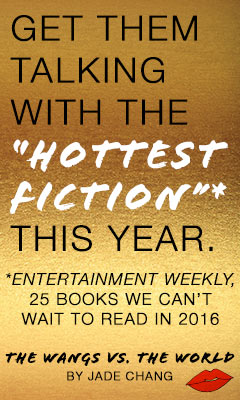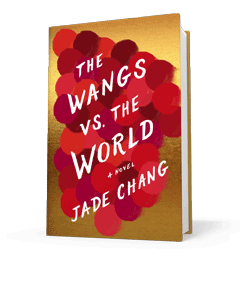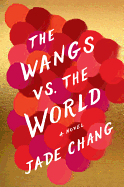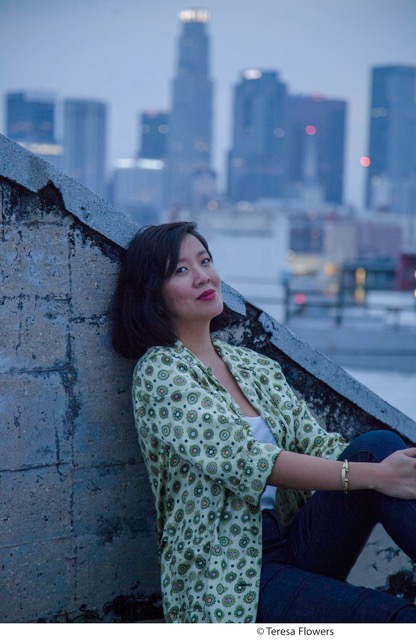The Wangs vs. the World
by Jade Chang
Jade Chang's first novel, The Wangs vs. the World, is an accomplishment: sparkling characters, family dynamics, humor and despair set against global historic and economic forces, rendering the title entirely apt.
Charles Wang is a proud patriarch. He has three beautiful, talented children (though his son hasn't slept with quite so many women yet as he should have, and his older daughter lives too far away), and has built a major financial empire in makeup manufacturing. He has the house in Bel-Air, the factories, the cars; his second wife has all the designer clothing, jewelry and handbags she ever wanted. He has a "sexy little cigarette speedboat painted with twenty-seven gallons of Suicide Blonde, his best-selling nail polish color--a perfect blue-toned red that set off the mahogany trim and bright white leather seats."
Until he doesn't.
In 2008, the Wang fortune evaporates, like so many others, due nearly as much to Charles's hubris as to the economic climate of the time. In the face of this calamity (frequently referred to in his inner monologue as "the Failure"), Charles turns to an old legend: his family's land in China, stolen by the Communists. This fable of luxury and excess was his birthright, and with the U.S.-based version collapsed, he determines to take his family back to the old country and reclaim what is rightfully theirs. And so a road trip ensues, with the patched-together family forming and reforming in various configurations cross-country.
Charles and his second wife, Barbra, depart the California home they no longer own in a powder-blue Mercedes station wagon nearly 30 years old, which luckily had been transferred into the nanny's name, so it wasn't repossessed with the other cars. They pick up stunned younger daughter Grace from her boarding school in Santa Barbara, then son Andrew from Phoenix, Ariz., where he'd been enrolled in college (working harder on his stand-up comedy routine than on his studies). The Wangs aim for the home of elder daughter Saina in the Catskills, where she struggles to regroup from her own personal trauma--and from there, for China. But on a southern detour, Andrew leaves the group for an older woman he meets at a New Orleans wedding.
The hilarity of filial antics on this road trip, "a troupe of Chinese Okies fleeing a New Age Dust Bowl," forms a central part of this story. But the larger narrative involves Charles's perception of the injustices done to the Wangs by history: Japan's invasion of China, immigration through Taiwan, investment patterns in the U.S. The next generation of Wangs has taken an artistic turn: Saina is a fallen darling of the New York art world; Andrew aspires to be a comic, but relies perhaps too heavily on Asian jokes; and Grace surprises her elders with her fashion sense (and a promising blog on the topic). The Wangs vs. the World is about generational and cultural challenges, and not just that of the Chinese immigrant to the United States. It is more about family than money.
This is a stylish novel, fun to read. The Wangs sometime speak in a mashup of English and Chinese that Chang leaves untranslated, though adequately understandable in context. Charles has his own prejudices, including a bias against "the tropical joke of Taiwan" and "the poor, illiterate, ball-scratching half men from Canton and Fujian." Each chapter shifts perspective, beginning with Charles the patriarch and cycling through outsider stepmother Barbra (whose further crime is to be not even Chinese, but Taiwanese), the three privileged but loving children, even the 1980 Mercedes.
Chang crafts her characters expertly, with nuance and precise details. In Charles's mind, makeup "was artifice, and it was honesty. It was science and it was psychology and it was fashion; but more than that, it was about feeling wealthy. Not money--wealth. The brilliant Aegean blues and slick wet reds and luscious blacks, the weighty packaging, with its satisfying smooth hinges and sound closures." In packing to leave his dorm, Andrew prioritizes "his top five pairs of sneakers--original issue Infrared Air Max 90s, Maison Martin Margiela Replica 22s, Common Projects Achilles Mid, beat-up checkboard Vans, and a pair of never worn Air Jordan 4 Undefeateds." Saina's social life in the Catskills is populated by few but absorbing characters--including an old artist boyfriend and a new one who's a farmer--who are among Chang's finest sketches. Andrew's economics professor offers an impassioned in-class explanation for the crash: "Every one of you ought to be furious because you are the unfortunate generation who will be graduating and trying to obtain jobs in a busted economy that we might well pack up and sell to the Chinese." These details, and perfectly formed dialogue, make an already engrossing story positively glitter.
As a novel with momentum and magnetism, reaching across generations from China and Taiwan to high-society California and New York to New Orleans and the Catskills, with stops along the way, The Wangs vs. the World undertakes an ambitious range of material. Chang manages both this sweeping plot and backdrop, as well as the finer points of characterization and relationships, with ease. The result is hilarious and heartfelt, witty and wise, and a prodigious achievement for a first-time novelist. --Julia Jenkins








